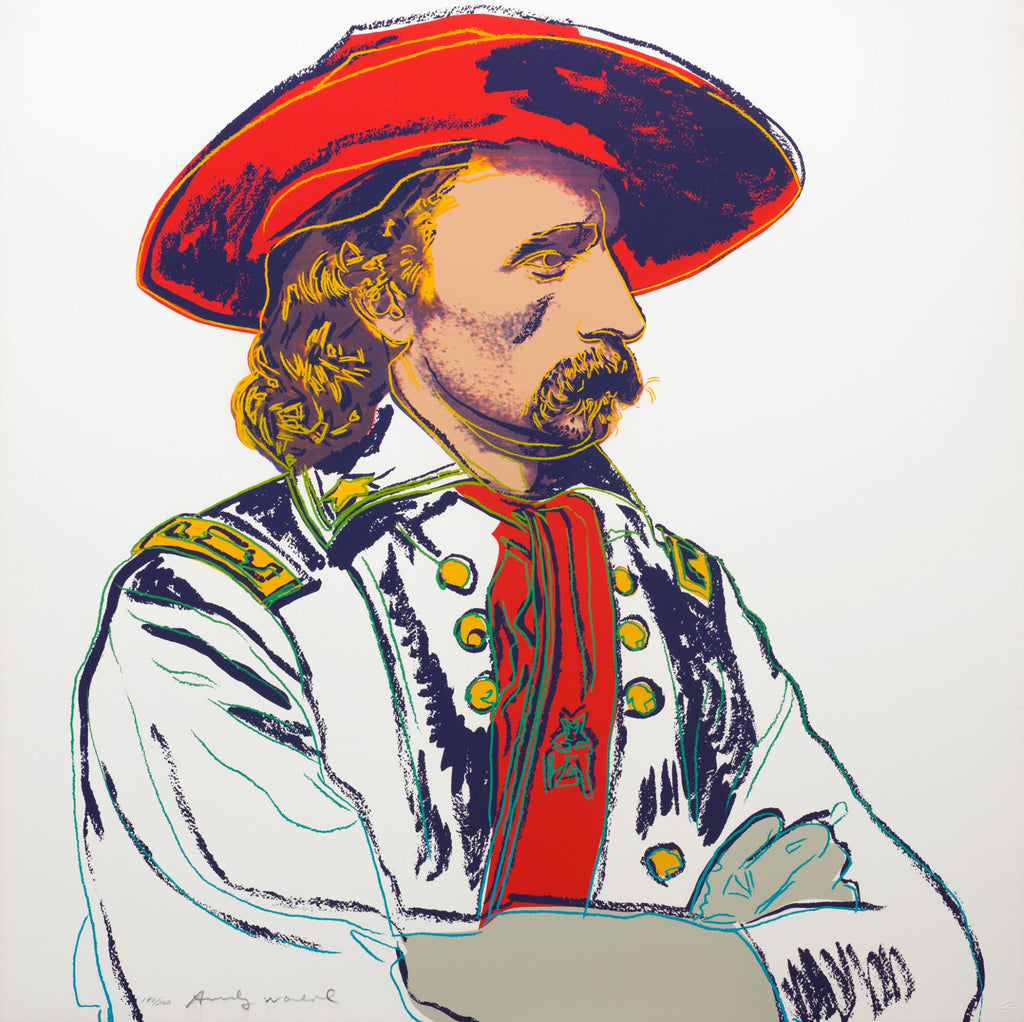Upload a photo of your space
For best results we recommend marking 10 inches on your wall with tape to get a sense of scale. Make sure to have the floor visible in the photo.






About the Work
"General Custer (FS.II.379)" is a screenprint created by Andy Warhol for his 1986 series "Cowboys & Indians". From the edition of 376, the artwork is signed 'Andy Warhol' and annotated lower left. The image size is 36 x 36" and the artwork is framed in a custom, closed corner, gold leaf frame. The artwork ships framed and accompanied by a certificate of authenticity.
In his 1986 portfolio, Cowboys and Indians, Andy Warhol turns his critical eye toward one of America’s most mythologized narratives, juxtaposing Indigenous culture and heroic Western figures. The portfolio serves as a line of interrogation between history, cultural identity, appropriation, and visual power. This print serves as visual and symbolic anchor within the portfolio.
General Custer presents the controversial cavalry commander as a glamorous icon — flattened, heroic, and commodified like a Hollywood star, yet beneath the glamor lies a legacy of conquest and catastrophe. By treating Custer in the same visual language, he used for icons like Marilyn Monroe or Liz Taylor, Warhol collapses celebrity and history into the same realm of iconography. The result is a complex critique of how American culture elevates violent figures into mythic status, often through the very images that Warhol both replicates and distorts.
Warhol’s Cowboys and Indians is a defining statement on the construction of American identity through images. These images form a provocative visual arc— highlighting the commodification of Indigenous identities, the exoticization of culture, and the removal of ritual artifacts from their context to the glorification of conquest and colonial violence. Bold, graphic, and conceptually sharp, they reflect Warhol’s lifelong obsession with how images shape perception and power.
Warhol reminds us that cultural icons and history circulate not only through museums and textbooks but through private eyes and daily spaces. Owning this print means owning not just Pop Art, but a mirror and commentary on American mythmaking, where beauty, irony, and critique collide in Warhol’s unmistakable style.
About the Artist
Andy Warhol is seen as one of the most prolific American artists of all time, whose undeniable influence proved him to be a leading figure within the Pop Art and Culture Movement. Warhol was a multitalented individual; he was an artist, filmmaker, producer, designer, and photographer. Warhol was born on August 06, 1926 in Pittsburgh, Pennsylvania. From an early age, Warhol was interested in the arts as he was often sick at home than at school. Rather isolated due to childhood illnesses, a young Warhol entertained himself by drawing and with other artistic hobbies. Eventually, Warhol graduated high school with aspirations to become an illustrator in the world of advertising. He received his Bachelor’s degree in Graphic Design from the Carnegie Mellon University of Technology and moved to New York to pursue his creative dream.
Please utilize the AR experience in a well-lit room.
Scan the room for surface detection.

Artwork will place in your room.
Using your fingers, align the horizontal white line
with your floor.

Double tap the artwork to scale to 100% size
and pinch to move on the screen.










